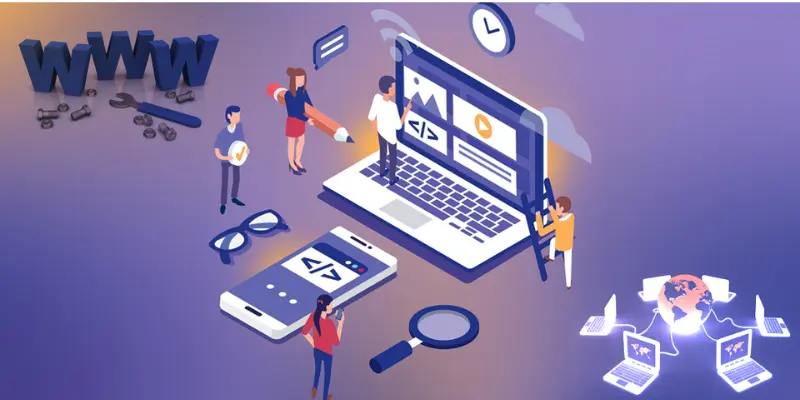MarketsandMarkets estimates that the managed service market will expand from $275.5 billion as of 2023 to an expected $372.6 billion by 2028.
The surge in demand demonstrates an essential shift in how firms manage IT. Managed IT solutions offer businesses a way out from managing complex systems, freeing them up to focus on core activities instead of technology issues.
On-demand IT service management has gained in popularity and offers proven business benefits. Fully managed IT solutions reduce time and expenses while increasing IT efficiency, security and allowing leaders to focus more on meeting their business goals.
Every business, regardless of size or industry, relies on computing technology for functioning. Unfortunately, due to rapid technological advancements, consumer services demand growth, and constant cyber security threats, some may lack the infrastructure necessary for effectively managing their networks.
This article describes both the advantages and drawbacks of managed services.
What Are Managed IT Services?
Managed IT solutions involve outsourcing diverse IT-related tasks and responsibilities to a managed service provider (MSP). They cover a wide range of IT activities, such as monitoring networks, cybersecurity, data backup and recovery software patches and updates, help desk support, and more.
The most distinctive feature of Managed IT services is that they're provided proactively, not reactively. MSPs adopt a proactive approach to monitoring and maintaining their customers' IT infrastructures and systems to prevent difficulties before they arise. They monitor, manage, maintain, and enhance IT equipment to maximize efficiency and dependability.
Managed IT solutions are provided via a subscription-based system that allows customers to pay a fee for subscriptions to access a variety of IT-related services and help. This model provides many benefits, including predictable expenses, scalability, and access to a staff of highly skilled IT specialists without having to recruit extra internal personnel.
Overall, managed IT solutions let businesses outsource managing their day-to-day IT infrastructure support to professionals, allowing them to concentrate on the main business goals while ensuring that the IT infrastructure they have in place is safe, robust, reliable, and effective.
Types of Managed IT Services
.webp)
Managed IT Services encompass various options that address different aspects of an organization's IT infrastructure and operations. These are the ten most popular types of managed IT services:
Network Monitoring and Management
It is the continuous monitoring of the company's network infrastructure, allowing it to spot and correct problems such as downtime, performance bottlenecks, and security breaches. MSPs, or managed service providers (MSPs), utilize specialized software to track real-time traffic on network devices' status and security risks.
Cybersecurity Services
Cybersecurity is a major aspect for all businesses of different sizes. Managed cybersecurity includes security assessments, threat detection, security patch management, security management for firewall security, intrusion detection, and prevention and incident response. MSPs utilize the latest security technology and the most effective practices to safeguard their clients' and systems' data from cyberattacks.
Data Backup and Disaster Recovery
Disaster recovery and managed backup solutions ensure the safe preservation of critical data. This allows quick restoration in the case of loss or destruction or other disasters such as cyber-attacks, hardware malfunctions, or natural disasters. MSPs use automated backup tools, redundant storage systems, and comprehensive disaster recovery plans to reduce downtime and protect against data loss.
Cloud Services
Cloud computing has revolutionized how businesses handle and use IT resources. Cloud managed services comprise cloud migration and cloud management, infrastructure as service (IaaS) and platform as a service Software as a service Cloud security, as well as cloud management. MSPs can help companies leverage cloud technologies to increase capacity, flexibility, and cost reduction.
Managed Endpoint Security
As the number of devices linked to the corporate network has grown, device security has grown to be a significant issue. Security services manage endpoints guard devices like desktops, laptops, phones, tablets, and computers from ransomware, malware, phishing attacks, and many other cyber dangers. MSPs install endpoint security products, manage security upgrades, and implement security guidelines for endpoints.
Help Desk and Technical Support
Managed help desks give end-users technical support and assistance with IT problems and queries. MSPs provide remote help desk service, onsite support, and 24-hour monitoring and assistance. Help desk support services address various issues, such as problems with software and hardware installation of software accounts management and user instructions.
IT Infrastructure Management
Managed IT infrastructure services include designing, deploying, optimizing, and directing a company's IT infrastructure. This includes servers and storage systems, as well as networking and virtualization. MSPs ensure that IT infrastructure parts are set up appropriately, work optimally, are secure, and comply with industry standards.
Managed Print Services
Managed Print Services help companies simplify their printing processes and reduce document and printing administration costs. These services manage printing devices like copiers and printers, improve printing workflows, check printing usage, and refill equipment and other supplies when needed.
Unified Communications and Collaboration (UCC)
Managed UCC Services allow businesses to increase communication and cooperation between employees, customers, and partners. The services offered include voice-over-IP (VoIP), video conferences, instant messaging, email, and collaborative tools. MSPs develop, deploy, and provide support for UCC solutions that work seamlessly with IT infrastructures already in place and increase productivity and efficiency.
Compliance and Regulatory Compliance
Conformity with industry regulations and regulations regarding data protection is vital to businesses that operate in controlled sectors. Management-led compliance services assist companies in evaluating compliance requirements, establishing security measures and guidelines to conduct audits and reviews, and ensuring compliance with regulations such as GDPR, HIPAA, PCI DSS, and SOX.
Benefits of Managed IT Services
Instead of coordinating every IT-related process internally, the majority of businesses nowadays opt to outsource entirely or partially IT management outsourcing for the following reasons:
Fill in the gaps of internal skills that are lacking
Managed services can benefit teams that do not possess the skills or knowledge to manage specific business processes within their organization or to focus on other tasks. The expert who delivers the service allows employees to focus on innovation, not repetitive work.
Reassurance, confidence, and a satisfaction guarantee
Because a managed service supplier is responsible for ensuring service availability throughout the day, companies don't have to be concerned about disruptions. Support and IT services will be provided according to an SLA outlining the service's timeframe and frequency.
A team of internal IT professionals typically juggles several responsibilities, and an MSP might concentrate on improving the process of providing a particular service. Monitoring the service's health and security and issuing corrections and upgrades as needed is a matter of monitoring the service's health and security and issuing corrections and upgrades as required.
Increase the productivity of your internal IT
Employees can focus on revenue-generating initiatives by outsourcing IT responsibility to managed service providers. Additionally, you will not have to put hours into finding, hiring, or training IT staff. Sometimes, IT service providers manage IT service providers and could also give advice or recommendations to improve efficiency. This could result in a higher return on investment and increased efficiency.
Control expenses and cut cost of acquisition
Because the price of MSP subscription plans is usually periodic and predictable, companies can manage their monthly, quarterly, or even annual IT budgets. Various managed services can be linked to fluctuating cloud-based expenses and are usually cheaper than acquiring permanent servers within the company. The cost is only the service or cover you need and avoid those costs with permanent employees.
An additional benefit of managed IT services is cost-effective access to new technologies. System upgrades are priced in the monthly MSP charge. Service level agreements (SLAs) could also provide reductions or fees that are canceled when the terms of service have not been fulfilled.
You must ensure that the IT infrastructure is always available
Managed IT Services use remote monitoring technology to control your IT systems around the clock. You can deal with issues before they significantly impact your business in real time.
If there is no regular oversight, the possibility is very high that a problem with your network will be discovered outside of normal business hours. When a system is down at night or in the middle of the night, it can take time for someone to find out about the issue. Sometimes, problems are not discovered until the following day, and the destruction has likely already been caused. Remote monitoring allows the MSP to take immediate remedial steps upon receiving an alert or a warning message.
Keep documentation up-to-date and decrease dependence on the tribal wisdom
Amid the constant management of routine activities and tickets, updates and modifications can be made on a whim, with or without documentation. When an IT administrator quits (or is fired), a knowledge gap occurs, leaving all employees uncertain regarding the best way to proceed. A reputable MSP follows standard procedures and records the most critical aspects of the working environment and any modifications that follow to ensure continuity and business as usual (BAU).
10 Common IT Managed Services Challenges Businesses Face (and How to Resolve Them)
.webp)
IT-managed services play an essential role. However, many companies face frequent issues with these solutions. This article focuses on the central matters of businesses with IT-managed service providers.
In addition, it provides practical strategies and methods for overcoming these obstacles to ensure your IT processes are efficient and smooth.
Sub-Par Technical Expertise and Knowledge
An issue prevalent with many MSPs is the insufficient technical understanding that causes continual IT problems for managed service providers. If you are considering an MSP, check their credentials in their field and then request cases that demonstrate their technical expertise.
Look for companies that provide the need for regular training for their staff and a team with different skills.
Inadequate Support and Response Times
Companies often need faster responses from MSPs, which can hinder immediate IT help requirements. To overcome this issue, it is important to choose MSPs that have a track record of fast and reliable solutions to issues (vital in light of the fact that even the smallest of companies can be liable to lose thousands of dollars because of slow response times).
Locate those who have specific response times in the Service Level Agreement, as well as established protocols for communication.
Lack of Adequate Staff Capacity/Resources
A few MSPs need help offering adequate resources, which affects the quality of their services. It is crucial to assess the staff-to-client ratio and how the MSP manages resources.
To provide quality and consistent IT assistance, pick MSPs with an efficient capacity management system and ensure an even workload.
Poor Compatibility with Existing IT Infrastructure/Applications
One central IT-managed service provider issue is making sure that the MSP will seamlessly integrate and further enhance the functionality of the existing IT platforms and software. Many MSPs do not have the knowledge required for seamless integration and compatibility problems that affect security and network functions.
Inadequate Maintenance Strategies
Companies often need help managing the IT infrastructure effectively due to MSPs in their efforts to manage it effectively. This can lead to frequent malfunctions or obsolete technologies. This could be particularly problematic with regard to technology-dependent operation.
It's essential to collaborate with an MSP that is focused on regular maintenance and ensures that your business operation is uninterrupted and effective.
Lack of Security Monitoring and Threat Protection
Robust security measures are unaffordable. Unfortunately, certain MSPs cannot provide sufficient security due to lacking skills or resources. The result is inadequate threat protection and response tactics.
In a work-from-home environment, one vulnerable device could affect the entire network. Therefore, it is essential to pick an MSP that focuses on monitoring security and responding to incidents.
Network Stability Issues/Outages
Stability issues and network outages frequently occur when MSPs lack monitoring and maintenance capabilities. They can cost businesses that rely on continuous IT access a lot.
To minimize interruptions to service, it is essential to ensure that the MSP is knowledgeable and has tools to ensure reliable network maintenance and rapid issue resolution.
Inefficient Management of Hosted/Cloud-Based Services
Cloud-based services can provide significant advantages, but their administration could be challenging for MSPs without specialized knowledge. It is common for them to have poor cloud services, which cannot meet the expectations of cost and savings in resources.
If you choose an MSP to provide cloud-based services, you must evaluate their expertise and ability to handle modern cloud technologies efficiently. For an extensive guide on picking the ideal IT service provider, read CloudSecureTech's list of criteria here.
Challenges in Managing Expansive IT Environments
Modern businesses typically run in vast networks, which encompass every kind of technology including computer systems and IoT devices. But, managing these massive IT environments demands a lot of expertise and funds.
MSPs that lack proficiency in these areas can cause issues such as slow system performance or security threats caused by obsolete software. Work with an MSP adept at managing massive, complex IT environments to prevent these risks and ensure that business operations run smoothly.
Inadequate Customer Support and Communication
One major problem of managed service providers is poor customer service and inadequate communication. Problems in reaching tech support or figuring out how billing works can create significant obstacles for organizations that depend on smooth IT services.
To avoid these problems, companies should carefully evaluate potential MSPs and focus on their track record of providing excellent customer service and clear and effective communications. Selecting an MSP with solid performance for these services is crucial to efficient and secure collaboration.
Conclusion
Managed IT Services offer a productive solution for companies looking to streamline their IT operation, increase security, and foster innovation while reducing the complexity and challenges of managing IT internally. When you understand the various features, types, and disadvantages of Managed IT Services, Businesses can make educated decisions and make the most of the potential of technology to meet their objectives strategically in this digital world.
Managed IT is a must for modern enterprises. The pace of digital transformation increases as your IT infrastructure grows and becomes more sophisticated, your IT infrastructure is likely to increase in complexity and size. A controlled IT services provider not only makes it easier to maintain but also allows you to set it up and benefit from the most recent technology.
Utilizing outside expertise to meet IT requirements can provide a variety of benefits, including lower costs, enhanced security, and improved operational efficiency. Through the use of specialized expertise and the most advanced technology, organizations can ensure that their IT infrastructure is secure and flexible, allowing them to concentrate on the core tasks and plan for strategic expansion.
FAQs
What are Managed IT Services?
Managed IT services refer to outsourcing the management of IT and assistance to a third-party service. This arrangement lets businesses concentrate on their primary business as they ensure that their IT infrastructure is well-maintained, monitored, and supervised by professionals. Managed Service Providers (MSPs) manage a variety of tasks that include cybersecurity, network management, data backup, and more.
What kind of managed IT services will be offered by 2025?
In 2025, Managed IT Services encompass a wide range of options, which include:
-
Internet and Infrastructure Control: Ensuring robust and reliable networking performance.
-
Cybersecurity Service: Protecting against cyber threats with the most advanced security techniques.
-
Cloud Services: Controlling cloud infrastructure and cloud services.
-
Data backup and Disaster Recovery: It is essential to ensure that your data is back in a safe place and is recoverable in the event of a catastrophe.
-
IT Assistance along with Helpdesk Service: Providing technical support for resolving IT problems.
What are the advantages of employing Managed IT Services?
The advantages of managed IT Services by 2025 are:
-
Cost Efficiency: Reduced IT expenses through the elimination of an in-house IT department.
-
Access to Know-how: Gaining access to an experienced team of IT experts.
-
Scalability: It is easy to scale IT services up or down depending on the business's needs.
-
Advanced Security: Implementing advanced security measures to defend against cyber attacks.
-
Concentrate on the Core Business: Allowing enterprises to concentrate on their primary business with no IT interruptions.
What challenges would businesses confront in the context of Managed IT Services?
Although Managed IT Services offer numerous advantages, they have some challenges. For instance:
-
Selecting the best provider: Choosintake time that meets your business requirements can be challenging.
-
Dependence on Third-Party Service Providers: Relying heavily on external service providers to fulfill crucial IT tasks.
-
Security of Data: Ensures the MSP is equipped with the most stringent security precautions to guard sensitive data.
-
Communications Issues: Maintaining consistent and transparent communications with the MSP.
What can companies do to ensure that they choose the best-managed IT Service provider?
For the most appropriate Managed IT Provider, companies should
-
Examine Experiential and Expertise: Examine the history and experience in the relevant fields.
-
Review Services Level Agreements (SLAs): Ensure the SLAs comply with the business's requirements and standards.
-
Look up references and reviews: Seek feedback from customers who are currently or have been clients in the past.
-
Learn pricing models: Check that your pricing model aligns with your business budget.
-
Ensure flexibility and scalability: The provider should offer services that can be adapted to the business's changing needs.






.webp)







Share this blog